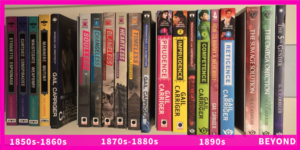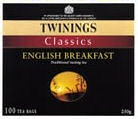The most frequently asked questions ~ all in one place! Please read this before you email Gail. Thank you.
Questions are never indiscreet, answers sometimes are.
~ Oscar Wilde
Gail also gets FAQ’s she feels the need to tackle in more thoughtful blog posts, you can find those here.
FAQ Books
-
What's next for Gail?
If you want to know exactly what Gail is writing right NOW that’s a secret only revealed in the Chirrup, her monthly newsletter. In general? These days Gail is writing Parasolverse spin off and tie-in stories featuring your favorite characters. She is also working on the San Andreas Shifters queer urban fantasy series, Tinkered Stars sci-fi books, and some non-fiction.
-
Where is the rest of the manga?
There are only 3 graphic novels: Soulless Vol. 1 (aka, Soulless), Vol. 2 (aka Changeless), and Vol. 3 (aka Blameless). Gail posts why only 3.
-
In what order should I read Gail's books?
-
Will there be more Parasol Protectorate (Alexia), Finishing School (Sophronia), or Custard Protocol books?
No. These characters are done with Gail mucking about in their affairs. (Blog posts One & Two on the subject.) However, many of your favorite characters show up in other series and in Gail’s tie-in works. Please join the Chirrup if you wish to be kept informed. Also there are lots of Easter eggs, hints, and threads that will make more sense if you read all her stuff.
-
Where is the ebook/audio/print version?
Audiobooks ALWAYS take longer. Ebooks drop on the official actual release date. Print is usually around the same time (often without a preorder first). Gail’s self-published works are distributed as widely as possible, on as many platforms as possible, including directly via this website. Gail is not in KU in order to ensure her work distributes widely and internationally. She does not distribute to Google Play for various reasons. You should be able to request any of her books from your local library in digital or print. Please do!
-
Why can't I get the English language ebook overseas?
Please read: Why You Can’t Buy an eBook in English Outside the US from Gail’s lovely agent.
-
How do I get an ARC of the next book?
If you are a blogger, pro reviewer, booktokker, booktubber, and/or bookstagrammer and wish to review Gail’s next Parasolverse or G.L. Carriger book, please drop her a calling card.
-
Audiobooks?
Where is it? Audio usually releases to Audible in the US within 3 months of print release. If you would like the option to own the mp3s for yourself forever, Gail offers these for purchase to Chirrup members only for a very limited time before the audiobook appears on Audible. Gail helps choose her voice actors. Finishing School and Custard Protocol series have the same reader. There are issues with the UK audio of Changeless, Competence & Reticence especially in the UK. That is the responsibility of Gail’s audiobook publisher, there is nothing she can do about it.
-
Could Gail suggest something else to read while I wait?
Gail has a blog post for you on books similar to her Parasolverse and a resources list with book recs. If you prefer the San Andreas Shifters here’s a list of suggestions, or if the Tinkered Stars is your jam, try these.
-
Can I get a signed copy/bookplate?
Show up at any of Gail’s events and she will sign (books, parasols, teapots, even biceps), or contact the bookstore before she visits to put in a special order. Gail does not supply bookplates or swag except occasionally to Chirrup members or in person. Signed limited & foreign language edition, Gail’s own special back stock, ARCs, first runs etc.. are only offered in the Chirrup. All Subterranean hardcovers & Soulless illustrated are signed.
-
What age group best suits Gail's books?
Gail’s youngest (known) reader is 8 and her oldest 95. While Soulless won an Alex Award it is not intentionally young adult. The Finishing School books are labeled “9 & up,” Crudrat is suitable to the same. Tinkered Starsong is more like 11 and older. If you’re concerned for your child, please read the book first yourself. Gail’s novellas & G.L. books are for mature audiences. Gail breaks down all her books by heat level in this post.
-
How long does it take Gail to write a book?
About 8 months. Why is writing a book so darn time consuming?
-
Why isn't the language (vocabulary, syntax, spelling) proper Queen's English? (AKA the ladybird issue)
The original English language editions of the Parasol Protectorate books came out with Orbit US. House rules required American language, spelling, and grammar. The same text was used for the UK editions. However, Gail made a fuss so the UK editions of the Finishing School books were anglicized. The Custard Protocol books are all anglicized except for some words (like ladybird) that American readers wouldn’t understand, these words are changed in the US editions. Gail’s novellas are left in her voice (which is a mix of the two, because of her upbringing and education). If you want more information about why each series is different, Gail blogs about The Ladybird Problem.
-
How did Soulless get its cover?
There were gankings, surprise Facebookings, and unexpected Gothic supermodels. See this exciting blog entry for the full story.
-
Can you tell us whether there will be a movie or TV show?
The Parasol Protectorate books are under option for animation (and have been optioned before. (On the unlikelihood of options becoming films.) Gail fantasy casts Prudence and Soulless see more of her casting and character visuals on Pinterest.
-
How does Gail feel about fan fiction?
She has a blog on fanfic as well as fan make. If you have photos of cosplay or fan art, please feel free to share them in her wikia Community. Please do not write slash about Gail herself, because *yuck.*
-
How does Gail choose/pronounce the names in her books?
There is a blog on that too and one for her sci-fi universe (because aliens make everything complicated especially linguistics). How to produce the “g” in Carriger? Hard, as in GIR. GAY-ll KAH-re-grr
-
Gail, will you help me with (or contribute to) my blog contest/promo interview/art project/research paper/homework/etc...?
~ Gail only reviews products or books that she has sourced herself and that she genuinely adores. Why?
~ Gail discusses her charitable contributions here. Please do not ask her to publicly endorse a charity/kickstarter or sign a petition on any public forum. As a rule, she prefers to keep philanthropic activities private.
~ For other requests, please contact her with exactly what you would like and what kind of time commitment is required including deadline. DO NOT do this over social media.
~ Gail is usually happy to do interviews. -
Will Gail come to my local convention, library, school, or bookstore?
Whether Gail visits your event rides on many factors:
~ Has she recently been to your area?
~ Has she recently done a similar event?
~ Has the event/bookstore/library invited her? -
What's Gail's educational background?
Social science, mostly. She has a BA with Honors in Archaeology, an MA in Anthropology, and an MS with Distinction in Materials Archaeology. This used to cause her to travel a lot and be overly concerned with research ~ writing has had exactly the same effect.
-
How similar is Gail's personality to Alexia's, Sophronia's, or Rue's?
Gail fully admits to sharing traits with all her main characters but there are other characters she feels closely resemble her, too. You are welcome to guess which. Should you ever meet Gail in person, you will be left in little doubt.
-
What's Gail's favorite type of tea?
Twinings 1706 Strong imported from the UK. It is malty and less brisk than American black teas. She takes it milky but strong with no sweetener. Gail’s epic tea post all about her favorites teas, tools, teapots and more.
-
What's with the cat?
Gail’s cat, Lilliput the Bean, is a female tux who does tricks on command. She is also trained to use the human toilet. Lilliput makes frequent Chirrup appearances. Percy’s cat, Footnote, in the Custard Protocol series is based on Lilliput.



